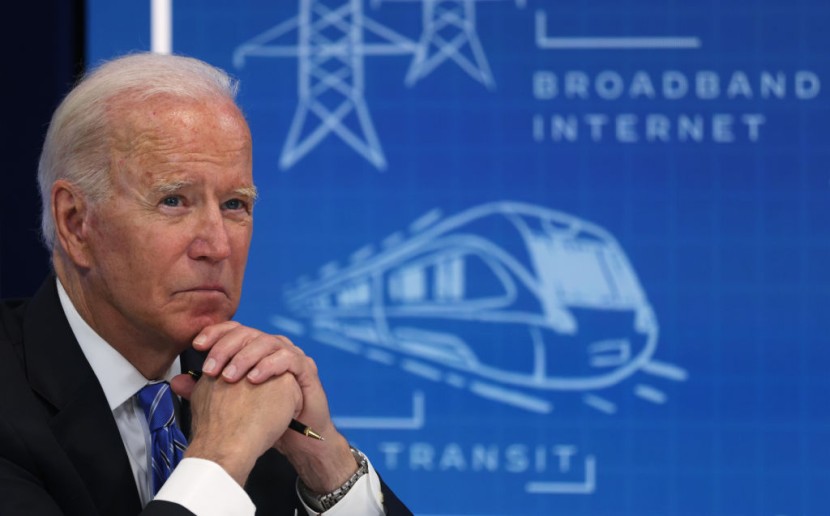
President Joe Biden made a speech today about his "Build Back Better" initiative, which aims to improve job development. However, Biden took the stage today under criticism after a contentious proposal was discovered in his $1.2 trillion infrastructure bill.
Under a new pilot program just authorized by the Senate as part of Joe Biden's $1.2 trillion bipartisan infrastructure package, American drivers might soon exchange paying gas taxes at the pump for owing the government yearly per-mile user fees.
$1.2 trillion infrastructure bill inclusion
On Tuesday, the bill cleared the Senate and will now be forwarded to the House of Representatives. The $125 million contracts will support the development of federal, state, and local VMT pilot programs to assess the viability of federal vehicle miles traveled tax (VMT).
Per The Sun, Joe Biden's infrastructure bill, which received a 69-30 vote in the 100-member house, will vastly improve transportation networks. Roads and bridges will receive $110 billion, public transportation will receive $39 billion, and railroads will receive $66 billion. The measure includes an additional $55 billion for water and wastewater infrastructure, as well as billions for electric car charging stations and airports. Biden's proposal is detailed out on The White House website, which concludes with a mission statement for the agenda.
President Joe Biden praised the proposal as a "historic investment," stating that the country is entering an "infrastructure decade" that would alter the country. The Infrastructure Investment and Jobs Act includes provisions for roughly $19 billion in subsidies for state-run Amtrak, $1.3 billion for the Federal Railroad Administration, and $225 million for the Administration's research and development. For the development of intercity rail, an extra $7.5 billion will be committed in $1.5 billion installments over the following five years.
Several provisions of the Act dedicate tens of billions of dollars to bringing high-speed internet to low-income and distant rural communities. The Affordable Connectivity Program, which is aimed particularly towards students, receives $14.2 billion. Rural Utility Services, which includes distant learning, telemedicine, and broadband internet, will get $2 billion, Vision Times reported.
Read Also: New York Hails Kathy Hochul as First Female Governor; Is She Related to Nancy Pelosi?
Infrastructure bill is Biden's presidency focus
The infrastructure package had become a centerpiece of Biden's presidency, with the president claiming that he came into the office to get things done. Although the bill that passed the Senate is a significantly reduced version of what he had envisioned, its approval on a bipartisan basis allows him to argue that he is following through on his pledge.
However, the battle is far from done. The infrastructure bill will now be sent to the House of Representatives, where it is not guaranteed to pass. Progressive Democrats have vowed to withdraw their support unless party leaders guarantee that a second budget plan would be passed, allowing trillions of dollars to be spent on health care, education, and social services.
Because Democrats have such a thin majority in the House, even a few Democratic defections may jeopardize the infrastructure bill. Other difficult decisions will put Biden's persuasive skills and capacity to carry out his program to the test, as per USA Today.
The government is battling a rise in COVID-19 infections caused by the highly contagious Delta variant and millions of Americans' unwillingness to obtain the vaccination that experts think will help bring the pandemic under control. The White House said on Friday that it is in early discussions with federal officials considering using government powers to push COVID-19 vaccinations among nursing care staff and domestic passengers.
Meanwhile, Biden issued an executive order earlier this month, requiring that by 2030, half of all new vehicles sold become electric. On April, 31 commercial and public transportation organizations, including UPS and the Association of American Railroads, sent a letter in support of VMT taxes to the House Transportation and Senate Environment and Public Works committees.
Some opponents of the VMT tax are afraid that substituting existing gas taxes will make electric vehicles less appealing. A big government-owned fleet, such as USPS, would be an "ideal testbed" for a national VMT tax, they noted.
Related Article: Joe Biden Says He Does Not Regret Troop Withdrawal, Insists Afghan Forces Must Defend Afghanistan Themselves
© 2026 HNGN, All rights reserved. Do not reproduce without permission.




